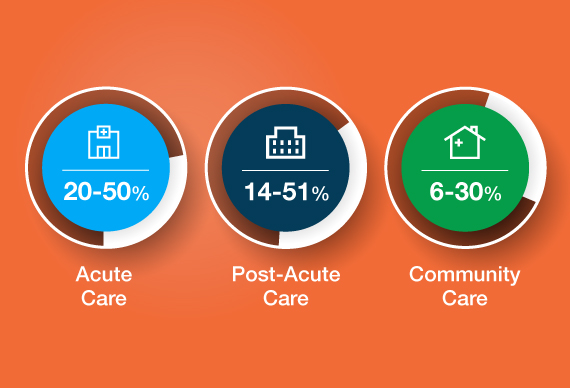Health Equity
The COVID-19 pandemic highlighted and worsened underlying healthcare disparities in access, risks, and outcomes for specific population groups. These differences may also be caused by social factors such as transportation, nutrition, education, housing, and child care—called social determinants of health. Identify patient groups at risk using our extensive data and rely on our expert guidance to identify opportunities to address this societal issue.

Payer Issues, Part 2: Health Plans’ Interventions to Address Food Insecurity
The growing prevalence and disparities in chronic diseases necessitate that health plans address food insecurity to improve patient outcomes. The combination of increasing need for access to healthy food and changes in the health policy and insurance landscape create opportunities to address food insecurity through a variety of payers.
Identifying and Treating Malnutrition Associated with Lower Readmission Rates
Avalere Health partnered with the Academy of Nutrition and Dietetics and other stakeholders for the Malnutrition Quality Improvement Initiative (MQii) designed to advance evidence-based, high-quality, and patient-driven care for hospitalized older adults who are malnourished or at risk for malnutrition.
Nutrition Support Therapy Could Potentially Save the Medicare Program $580 Million
Avalere’s findings were featured in the Journal of Parenteral and Enteral Nutrition.
Addressing Social Determinants of Health Requires a Strategic Approach in an Evolving Healthcare Environment
Increasing pressure on providers to assume accountability for meeting the goals of the Triple Aim has inspired a new focus on the social determinants of health.
Avalere’s Nutrition Experts Featured in Latest Health Affairs Blog Post
On January 24, Avalere’s Christina Badaracco and Senior Advisor Wendy Everett published a piece in the Health Affairs blog highlighting the need to improve malnutrition care and provide possible pathways to a solution.
Policy Issues, Part 1: Promoting Health by Addressing Food Insecurity
Various national and local health policies aim to address food insecurity through both healthcare and community-based programs.
Opportunities to Integrate Social Determinants of Health into Healthcare Delivery
The National Academies issued a report identifying several key factors and recommendations for integrating social care into healthcare delivery.

New Innovations in Healthcare Aim to Address Social Determinants of Health
A wide variety of health plans, provider networks, and national corporations have recently developed and announced innovations and strategies to expand access to healthcare and to address needs that promote health across communities.
Avalere’s Malnutrition Initiative Featured in the Journal of the Academy of Nutrition and Dietetics
Avalere’s efforts to advance the national Malnutrition Quality Improvement Initiative featured in newly published supplement of the Journal of the Academy of Nutrition and Dietetics.

How to Account for the Full Impact of Social Determinants of Health in Medicare Advantage Plans
Avalere experts recently presented “Risk Adjusting Medicare Advantage Plan Performance Measures for Social Determinants of Health: Are Dual Eligibility and Disability Status Enough?” at the Academy Health 2019 Annual Research Meeting.
Interview: The Growing Role of Digital Health and How It’s Shaping Patient Engagement
Tune in as Avalere experts interview each other on hot topics in healthcare. In this discussion, Avalere Consultant, Priya Gaur is interviewed by Camille Boler, Associate, on the increasing role of digital health and how it's influencing patient engagement.
Interview: E2 – 8 Rules for Implementing New Medicare Advantage Supplemental Benefits
Check out the second interview in our series on new supplemental benefits offered through Medicare Advantage plans for 2019; Kenny Kan and Erica Breese discuss the "rule of 8."
Video: Improving Malnutrition Care Quality to Support Better Patient Outcomes
Over the past several years, Avalere has collaborated with the Academy of Nutrition and Dietetics to establish and support the Malnutrition Quality Improvement Initiative (MQii).
Interview: E1 – New Supplemental Benefits Offered Through Medicare Advantage Plans
In episode 1 of our series Fred Bentley, Sean Creighton, and Kenny Kan discuss the new supplemental benefits offered through Medicare Advantage plans for 2019.

The Data Behind Social Determinants of Health Research
New Avalere study entitled “Using Aggregate Data to Proxy Individual-Level Socioeconomic Characteristics in Research on Medication Adherence: 9-Digit ZIP Code vs. Census Block Group” selected for the AMCP Foundation Best Poster Award at AMCP Nexus 2018.

Medicare Advantage Beneficiaries Will See a Jump in New Supplemental Benefit Offerings in 2019
MA plans expand coverage of supplemental benefits following administration’s policy change.

Dialogue Proceedings / Advancing Patient-Centered Malnutrition Care Transitions
Although malnutrition can lead to greater risk of chronic disease, frailty, and disability, and increases healthcare costs, patients’ nutrition status is rarely evaluated and managed as they transition across care settings.
CMS Expands Benefit Flexibilities in Medicare Advantage
Earlier this year, the administration granted Medicare Advantage plans greater flexibility to target benefit designs for individuals with certain high-risk health conditions. These changes are expected to position the program for continued growth.

Hidden Epidemic of Older Adult Malnutrition: New National Blueprint Advances Integrated Solutions
Citing alarming statistics that show that nearly 1 of every 2 older Americans is at risk of malnutrition and that disease-associated malnutrition in older adults is estimated to cost $51.3 billion annually, a broad group of advocates laid out a roadmap for a new national effort to help millions of Americans who suffer from malnutrition or could be at risk as they grow older.
Interview: E5 – A National Call Action: Using Tools to Defeat Malnutrition Care Challenges in the United States
In the final episode of our series for Malnutrition Awareness Week™, Avalere's Kristi Mitchell is joined by Bob Blancato to talk about the growing crisis of malnutrition care and its impact on older adults. Bob is the president of Matz, Blancato, and Associates, the national coordinator of the bipartisan 3000-member Elder Justice Coalition, and the executive director of the National Association of Nutrition and Aging Services Programs.





